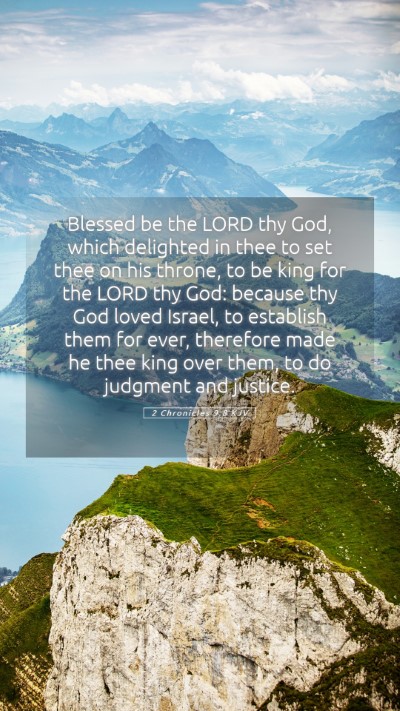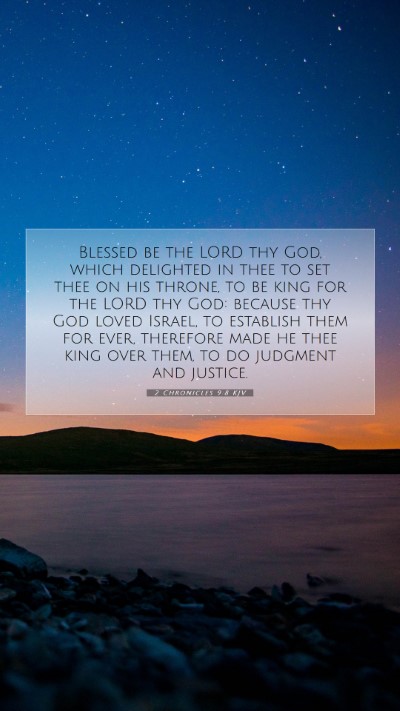Bible Verse Meaning and Commentary on 2 Chronicles 9:8
Verse: "Blessed be the Lord thy God, which delighted in thee to set thee on his throne, to be king for the Lord thy God: because thy God loved Israel, to establish them for ever, therefore made he thee king over them, to do judgment and justice." (2 Chronicles 9:8)
Understanding 2 Chronicles 9:8
This verse captures a profound moment of affirmation regarding the kingship of Solomon. It reveals themes of divine favor and the sacred responsibility of leadership.
Insights from Public Domain Commentaries
Matthew Henry's Commentary
Matthew Henry points out that this verse is a reflection of God's choice of Solomon to rule over Israel. It emphasizes the importance of acknowledging the source of blessings and the purpose behind positions of power. Henry notes that Solomon's rule is not merely a personal achievement but is rooted in God's love for Israel.
Albert Barnes' Commentary
Albert Barnes highlights that the visit of the Queen of Sheba serves as an acknowledgment of Solomon's wisdom, which is a gift from God. He interprets the queen's blessing of God as a recognition of the divine providence that ordained Solomon's kingship. This illustrates the idea that royal authority is divinely sanctioned to promote justice and righteousness among the people.
Adam Clarke's Commentary
Adam Clarke explains that this verse connects God’s love for Israel with His choice of Solomon as king. Clarke emphasizes that the Lord's delight in Solomon signifies that leadership involves not just authority but also accountability to God’s laws. He notes that through Solomon, God intended to establish a society founded on judgment and justice, which should be the aim of any ruler.
Key Themes and Messages
- Divine Selection: Solomon’s kingship is depicted as part of God’s plan for Israel, showing that leaders are chosen for a purpose.
- Justice and Righteousness: The role of a leader involves the responsibility of administering justice and ensuring equity among the people.
- God's Love for His People: The establishment of Solomon as king is directly tied to God's affection for Israel, indicating that God's favor rests upon those He appoints for leadership.
Historical Context
This passage is set in the context of Solomon’s reign, during which Israel experienced a period of prosperity and peace. Understanding the historical background of Israel’s monarchy helps in appreciating the gravity of Solomon’s responsibilities as portrayed in this verse.
Application of the Verse Today
For contemporary readers, 2 Chronicles 9:8 serves as a reminder of the importance of godly leadership. It encourages us to seek leaders who embody justice and righteousness, reflecting the principles reflected in Solomon’s reign.
Additional Cross References
- 1 Kings 3:5-14: God's granting of wisdom to Solomon.
- Psalm 72: A prayer for just leadership.
- Proverbs 16:12: The importance of righteous rule.
Conclusion
In summary, 2 Chronicles 9:8 encapsulates the divine mandate behind Solomon’s kingship. The implications of this verse extend to the modern understanding of leadership, emphasizing justice, accountability, and the responsibility leaders hold toward their communities. Through this scripture, we gain important insights into the characteristics of godly governance.


